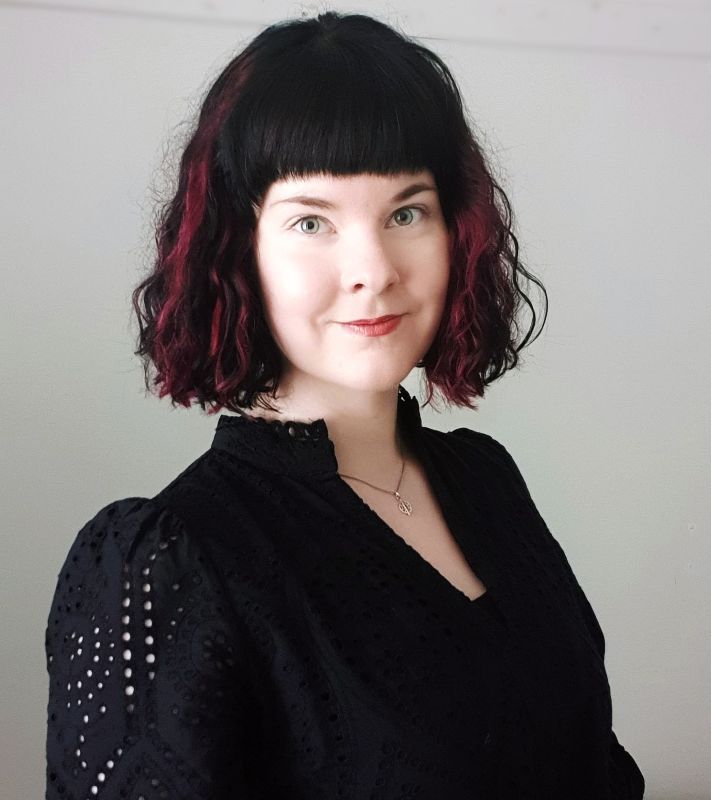Content editor
"I enjoy the versatility, independence and flexibility of my work and being able to immerse myself in texts in peace. You also constantly learn new things in this work. In addition, I belong to a great team that always provides help and support. I think it’s great to be able to contribute to making studying possible for those who might not otherwise have the opportunity to do it."

- Salla Hiltunen
- Content editor at Nettilukio and Nettiperuskoulu, which are maintained by Otavia, a company owned by the City of Mikkeli.
- Graduated as Master of Arts from the University of Eastern Finland majoring in Finnish and minoring in communications and English, completed information science studies at Tampere University and is currently studying in the technical communication master's programme at the University of Vaasa.
- Six years of work experience in the field.
Briefly explain what you do for a living.
I work at Nettilukio and Nettiperuskoulu. Both are adult education institutions that are accessed online. Students use our online learning environment and study there on online courses that we have produced.
My job is to read, comment and edit online course scripts. I modify the scripts to work as well as possible as complete online courses. I pay attention to structure, content, tone and language, among other things. Of subjects, I’m particularly responsible for Finnish language and literature, Finnish as a second language and English language.
I also build online courses in our online learning environment. My work also includes visual design and preparing various instructions, for example. In addition, I write new learning material texts and plan assignments when necessary.
How have you ended up in the profession of your choice?
I’ve loved Finnish and reading, writing and editing texts since my youth, which is why I applied to study Finnish at a university. After graduating, I’ve done various tasks related to writing and communications.
I ended up working as a content editor by applying for an open position. An editor at a publishing company has always been one of my dream jobs, and the work of a content editor is quite close to it.
Describe your typical working day or week.
Days and weeks vary somewhat, especially now when I also do project work in addition to my regular tasks. My favourite workdays are the ones where I can immerse myself in a single project, that is, delivering a specific script, or building an online course. Many days are like this. However, sometimes several projects are in a phase that requires jumping between them during the same day. Fortunately, I don’t have daily meetings, which I’m happy about.
What kind of work environment or working hours do you have?
I work remotely in the peace of my own home. Our offices are located in Mikkeli where some personnel work on site. A couple of times a year, we gather together somewhere with the entire work community.
My working hours are flexible, but I mainly work during office hours. My weekly working hours amount to just over 36 hours, and I try to distribute them fairly evenly during the working week by working slightly over 7 hours a day.
What kind of competence or qualities are required in the profession?
This work suits those who enjoy working closely with texts in cooperation with others. Good self-management skills and cooperation skills are quite central.
The work naturally requires excellent textual skills, especially accurate and analytical reading skills, language planning and maintenance skills and editing skills. You must be able to both pay attention to small details and to perceive the bigger picture. You must also have an eye for visuals. An understanding of pedagogy and online learning helps, but you will also learn it by doing.
What is the best thing about your profession?
I enjoy the versatility, independence and flexibility of my work and being able to immerse myself in texts in peace. You also constantly learn new things in this work. In addition, I belong to a great team that always provides help and support.
I think it’s great to be able to contribute to making studying possible for those who might not otherwise have the opportunity to do it.
What are the downsides of the profession or what seems challenging?
The work is done in cooperation with producers of learning materials and teachers of online courses, and cooperation with everyone is not always without problems. The extent to which the scripts require work also varies greatly. Sometimes you come across scripts whose content, scope or level of difficulty does not correspond to the curriculum or which otherwise require a particularly large amount of work. On the other hand, making the most difficult cases ready for publication is also most rewarding.
What would you tell a person considering the profession of a content editor?
I warmly recommend studying linguistics, especially Finnish language studies. This work requires an in-depth understanding of language and its operation, and you must be able to justify your own modifications. Finnish language studies provide tools for this. Pedagogical studies are certainly not a bad idea either.
The work is largely independent, even though it’s done in cooperation with others. It’s worth considering how you feel about spending your days sitting alone examining texts at different levels, thinking about ways of clarifying difficult and complex parts and writing comments and editing suggestions. I think it’s wonderful, but work like this doesn’t suit everyone.
How do you see the future of your profession?
Online studies are becoming increasingly common, so the need for clear and high-quality online learning materials is also constantly increasing. There will certainly be plenty of demand for experts who can produce them in the future.
